
Date: 2026-03-03 Page is: DBtxt003.php txt00003089
Country ... Liberia
News ... Alfred's Free Press
One innovative journalist has found a way to get daily news and information to Liberians – with the aid of a blackboard.
COMMENTARY
I went to Liberia for the first time in 1974, and went back a good number of times over many years. It is extremely disappointing to see the potential for progress highjacked by local Liberians who have looked only to their own self interest and 'begger thy neighbor' as far as everyone else is concerned. I saw a lot and learned a lot through my experiences in Liberia. I have also been disgusted by a lot of the expert advice that has been given to Liberia by international consultants and major organizations like the World Bank, the IMF. USAID and others.
I like this 'blackboard' story because one of the issues I have with international consultants and experts is that they have little appreciation of the power of very simple things done with enthusiasm and relevant to local people.
Peter Burgess
Alfred's Free Press One innovative journalist has found a way to get daily news and information to Liberians – with the aid of a blackboard.
In Liberia, a country where radios and televisions are luxuries most people cannot afford, one enterprising journalist has found a way to get daily news and information to Liberians. Alfred Sirleaf founded an innovative newspaper, The Daily Talk.
The paper is Alfred's answer to the misinformation he says caused Liberia's brutal civil war. His innovation is to write it up each day on a blackboard in the centre of the capital, Monrovia, accessible to all.
Witness goes behind the scenes of The Daily Talk, following the tireless Alfred in his pursuit of news and getting to know some of the readers who make the newspaper a central part of their daily routine.
Filmmaker's view: David Lale
I spent much of my time in Monrovia, Liberia's capital, loitering on a traffic island amid the dust and fumes of Tubman Boulevard. As it happens, this turns out to be a good vantage point to watch the world go by: presidential motorcades, boda-boda cycle taxis, Chinese construction machinery, liveried NGO vehicles and UN Land Cruisers trundle by, as well as the tide of pedestrians flowing into town in the morning and back to the shanties at sundown. All of Monrovia passes here. And on their way, many stop to read about what is going on in the world at The Daily Talk, a chalkboard 'newspaper' displayed on the side of a decrepit wooden shack.
Meet the readers of Monrovia's chalkboard news
I had recently produced a documentary project about Nairobi's 'jua kali' culture, the ingenious solutions that the city's slum dwellers find for the demands and difficulties of slum life, from inexpensive shoes fashioned out of old tyres and kerosene lamps from coffee cans, to bootlegged electricity and jerry-rigged water supplies.
So when I heard about a hand-written news service in Liberia's capital it struck a chord as very much part of the same do-it-yourself spirit.
This street news service is the brainchild of Alfred J Sirleaf, a tireless dynamo of a man who lists founder, proprietor, editor-in-chief and principal correspondent among his job descriptions at The Daily Talk.
He is on a mission to provide daily information on local, national and international issues - free of charge - for a community that might otherwise not be able to access or afford the news.
I set out to document Alfred's work - but more than this I found his homespun news agency offered a window onto everyday life in Liberia at a critical time of change.
'The legacy of the war created poverty, hardship. It is this war that prompted the creation of The Daily Talk. I saw the need of people wanting to be informed but there was no means of getting information, so the idea of the board came to me, The Daily Talk newsboard, the chalkboard newspaper. I believe that people should be informed of what is happening.' - Alfred J Sirleaf, the founder and editor-in-chief of The Daily Talk
While the world's media waited for a verdict in Charles Taylor's war crimes trial, Liberia was gearing up for its next presidential elections and life in the capital was at last returning to normality following 14 years of civil war.
As I hung around Alfred's traffic island on Tubman Boulevard I met some of the passers-by that depend on him for their news: Michael, a former child soldier who makes a living selling souvenirs to international aid workers; Nathan, a trainee pastor striving to build a new church; Kormassa, a single mother who juggles nightshifts at the hospital with raising her children; and Larry, who teaches the pupils at Hope School for the Deaf how to fend for themselves.
These characters, who I happened to meet as they stopped by Alfred's shack to read the day's news, tell their own stories in this documentary, and if this random sampling of Monrovian society is anything to go by it is clear that Liberians do not have time to dwell on the past - they are busy making the best of the present and dreaming of the future.
While the global media too often define Liberia in terms of the tragedy of the recent civil war, from its street-level perspective The Daily Talk describes a busy, hopeful nation in the process of renewal.
Source: Al Jazeera
Meet the readers of Liberia's chalkboard news
A unique roadside news outlet provides daily local and global news to those who cannot afford a television or newspaper.
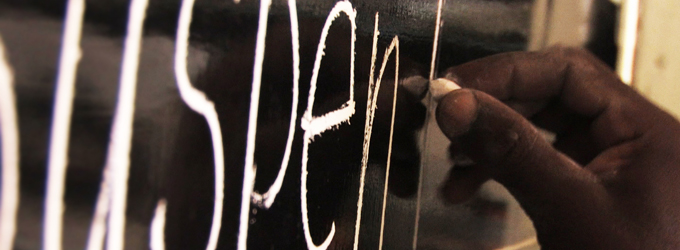
Alfred Sirleaf's The Daily Talk newspaper reaches thousands of Liberians every day but he only ever produces one copy. He writes the day's biggest stories on a large blackboard beside a major road in the middle of the capital Monrovia.
He founded The Daily Talk to keep Liberians informed on the political, economic and social issues affecting their daily lives as many of them cannot afford electricity, televisions or newspapers.
The chalkboard newspaper displays the day's news in local dialect and is also read aloud to help the illiterate stay informed.
Witness follows some Liberians relying on Alfred's free news service:
Michael
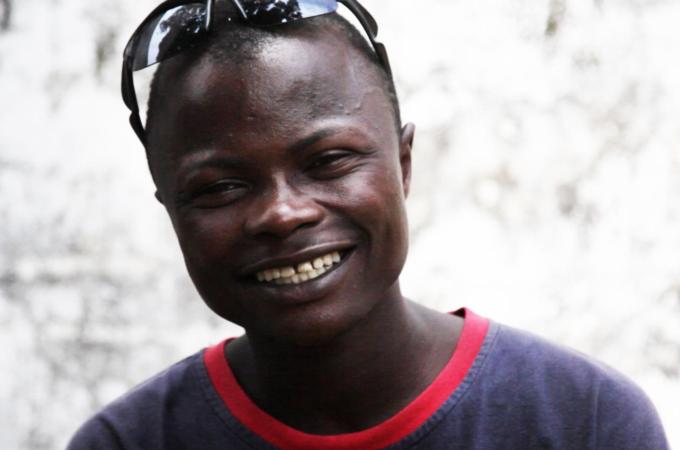
IMAGE
Michael is a former child soldier who fought in Liberia's civil war. He now sells souvenirs made from empty bullet casings to international aid workers and tourists.
Every time he passes by, he stops at Alfred's chalkboard newspaper for about 15 minutes to read what is going on in his country and across the world.
'When the war was coming to the country, people were forced. They take you and they give you a gun and they risk your life. They say 'you go and fight'. It happened to me.
The whole country was at war, so I was compelled to do it for my life. It's like you take a gun and you go to hunt animals in the forest. And the other animals take guns against you and you're hunting one another.
Many times friends of mine got wounded, lost their legs, lost their hands and even lost their life. That's what war is like. I felt most happy when the war ended.
I'm an artist, that's what I do to make a living. I use the empty bullet casings to create stuff. Our idea is a transformation from war to peace.
For me to go around and people buy from me and I make money it makes me feel very happy. To be able to sell what I produce myself I feel happy.'
Nathan
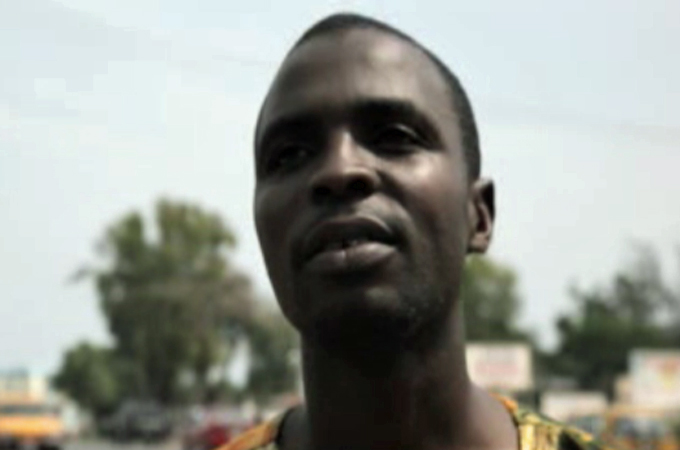
IMAGE
Nathan, a trainee pastor striving to build a new church, checks Alfred's chalkboard every morning to get information from The Daily Talk.
'Information is the bridge between failure and success. There are many people that hate one another. So the only way we can bring them back together is religion. It matters a lot. During the war my parents left me. They ran away and they left me and I was left alone. But God sent a messenger to rescue me.
We are trying to build a church and when you come here and see a new building I know you will feel happy and say: 'Yes, something is happening around here. I think change is coming to Liberia.' By us building a church, the people will feel that God is still with them.'
Kormassa
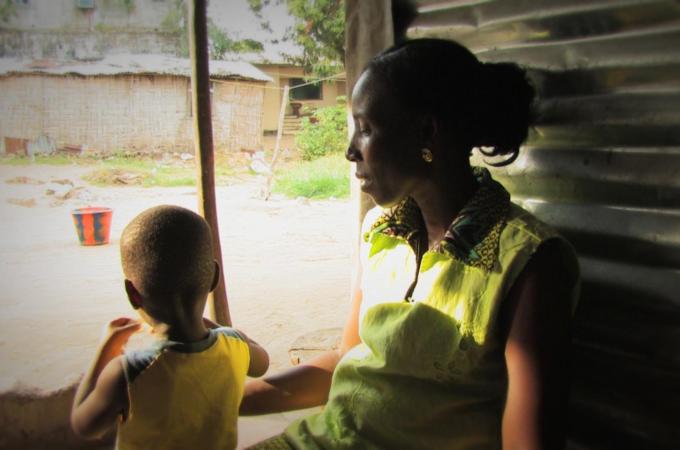
IMAGE
Kormassa, a single mother who juggles nightshifts at the hospital with raising her children, relies on The Daily Talk to keep herself informed about local and global politics.
'I don't have TV now. If you don't listen to the radio to get news, if you don't read newspapers, the only place you can get news is from The Daily Talk. For now, I'm working in the laundry at JFK [hospital]. I'm on nightshift. I just have to do it to live because that's the only thing I can do to earn money and to live. I'm in a mud house for now because I don't have the money to rent a concrete building. Where to go when you don't have money to for the rent, so we are just there.
I have two children. My daughter is 18 years old now and the other one's just going to be three. The first one is from one father, the other one from another father. I'm responsible because they both live with me, responsible to feed them, to take care of them. It's difficult, I need someone to help me. For now I'm not married, I've not found no one yet. I don't like men to beat me. That's my fear, I don't like it. I'm looking for a God-fearing person, who has God in his heart.
The little one asks too many questions and I have to answer all of his questions. I only get one day to stay with them, it is very difficult, but what can I do? When I'm in my own house, married with my husband, with my children and living a better live than this, I'll be happy.'
Larry
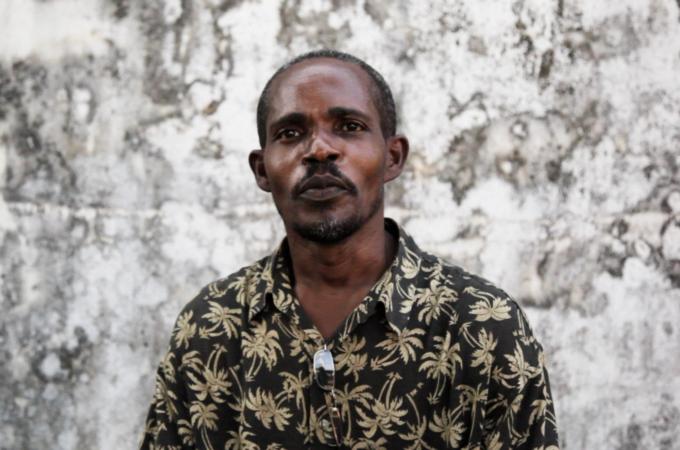
IMAGE
Larry is a shoemaker who teaches the pupils at Hope School for the Deaf how to fend for themselves.
'The Daily talk helps to educate the people. It's done in our own local English that we speak around, so it gets people interested.
There's a deaf and dumb school on 12th street, I'm training a group of them. In our society in Liberia, for those who are 'normal', who acquire education, to get a job is very hard, so what about a man who is not 'normal'? No one will want to employ him. So I believe we have to help them. Sometimes I get frustrated, you are talking to him, trying to teach him but he's not paying attention to what you're teaching. So I say: 'You see these shoes? - I make these shoes and I sell them for $25 or $35. Plenty of money. And you can do it too. You can make, you can sell.' I try to motivate and encourage them. If I can do that then I've made a mark. Then they too can earn a living by doing something with their hands.
I take pride in my work. I love doing it because people praise me for that. It is satisfying to me because that is also promoting my country. Comparing Liberian-made shoes with imported shoes, especially from China - the Liberian shoes are more durable. I've been using these shoes for the past five years. I wear them almost every day. And they've still got four to five more years to go.
I think that one day the Liberian people will have a factory to make our own shoes. That is also my dream because I would be very, very discouraged to have outsiders coming here and opening a shoe factory and having me employed to work for them! To work for them instead of having my own factory owned by Liberians that can employ other Liberians. My greatest dream ... in my life is my business. I don't want to sit there knocking together one pair of shoes all day, so one day we'd like to see our shoes exported. With the inscription 'Made in Liberia'. I want to be a millionaire! I hope and I pray that we live to see that dream come true.'
Source: Al Jazeera